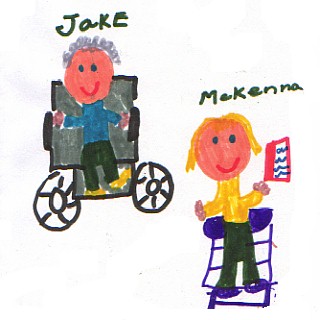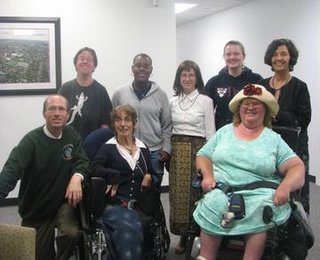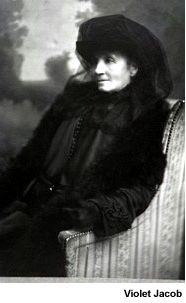Friday, September 29, 2006
Grimsley on academia and bipolar disorder
"Academics are nothing if not clever in conveying their prejudices," writes historian Mark Grimsley in "An Inappropriate Illness," a new essay at Inside Higher Ed. When a professor is upfront about a hidden disability with his colleagues, he finds a stigma still attached to it--because a stigma voiced in more polite or bureaucratic terms is still a stigma.
Labels:
bipolar,
hidden disability,
higher education,
stigma
Wednesday, September 27, 2006
Mac's "Accident"

So Stephen Kuusisto and Wheelchair Dancer have weighed in so far about the new "Accident" ad from Mac, in which the PC played by John Hodgman is seen in a wheelchair, with two arms and a leg in casts, explaining that someone tripped over his power cord. (There's a still shown at right; the video version is at YouTube.) It's meant to point out that Macs have a magnetic cord attachment that easily detaches when tugged. But...hmmm. They're still playing with the wheelchair = broken cliche. I agree with Wheelchair Dancer that they're trying really hard to emphasize the "injury," not the "disability"--thus the giant plaster casts. But still.
Beth Haller pointed out an alternative in 2001: An award-winning Cingular Wireless ad aired during the Superbowl that year featuring Dan Keplinger, an artist who uses a wheelchair. There, the message was about self-expression, changing attitudes, adjusting expectations upward, and embracing the new. It can be done.
Tuesday, September 26, 2006
Is it time for a Carnival?
The monthly Disability Blogs Roundups we've been posting here at DS,TU for over a year have been a lot of fun to assemble; but every month, there are more and more blogs to read, and I feel like we're letting a lot of good stuff slip by. One solution would be a blog carnival instead--so folks could submit their best posts and the best posts they've seen elsewhere. We'd also be able to share hosting duties with other blogs.
So, just as a trial, I've set us up on blogcarnival.com. Click here for the place where you can submit links, by October 9, for posting October 12. Just want to see how this works. Either way, we'll either have a carnival or a roundup here, that week. If the carnival works, then we can set up a schedule of host blogs to share around the fun. Volunteers?
So, just as a trial, I've set us up on blogcarnival.com. Click here for the place where you can submit links, by October 9, for posting October 12. Just want to see how this works. Either way, we'll either have a carnival or a roundup here, that week. If the carnival works, then we can set up a schedule of host blogs to share around the fun. Volunteers?
For parents: Talking to Preschoolers about Disability
 Blue at Gimp Parade recently posted about a positive stranger encounter: a mother who was graceful enough to respect both Blue's privacy and her own child's curiosity about disability. It reminds me that I wrote up an essay called "Talking to Preschoolers about Disability" when my daughter was in preschool and her friends were meeting my son. The other parents asked me what they should say about him, when their children asked questions like “why can’t he walk?” These were the tips I gave:
Blue at Gimp Parade recently posted about a positive stranger encounter: a mother who was graceful enough to respect both Blue's privacy and her own child's curiosity about disability. It reminds me that I wrote up an essay called "Talking to Preschoolers about Disability" when my daughter was in preschool and her friends were meeting my son. The other parents asked me what they should say about him, when their children asked questions like “why can’t he walk?” These were the tips I gave:Be reassuring. Preschool children are often empathetic, and they may be upset when they imagine that another child is in pain. Most people with disabilities are not in constant pain, or sad about their disability, so you can reassure the child about this: “He can’t walk yet, but that’s okay. He seems happy, and I know his parents love him--those are the important things.” You may also need to reassure your child that another person’s disability is not contagious -- this is a common fear of children.
Watch your nonverbal cues. Kids are attentive not only to our words but to our behavior. The tone of your voice, the expression on your face, and your body language will tell your child a great deal. Avoid a pitying or hushed tone in discussing disability; smile and relax, so you can convey that you’re comfortable with all different shapes and sizes of people, and you hope they will be, too.
Encourage curiosity. Curiosity is natural in children, and they may stare in their wondering. Telling them “don’t look” sends a message that something is terrible, or embarrassing. Instead, affirm their fascination: “Oh, you’re looking at his blue chair, aren’t you? It’s very interesting. Maybe it helps him sit up so nice and straight. Should we ask him?”
Everybody is different. You may find yourself saying "he's special," but it’s always good to tell your child that she’s special too. You might say, “Everyone is unique in some way; that boy moves differently from most of the children in our class. And you are special because...”
A kid is a kid. It’s also good to emphasize that children with disabilities mostly do the same things as other kids. My son rides the school bus, plays in the park, goes swimming, likes toys and cartoons, celebrates birthdays, and needs to take a bath and go to bed every night, just like other kids. This information may be greeted by a barrage of questions about “how?” Which leads to the last point...
It’s okay to say “I don’t know.” If you don’t know the answers to their questions, say “I don’t know.” This is always better than making up an answer that may confuse or worry the child needlessly. For questions about the future--"Will he ever walk? Will he ever talk?"--it's also truthful to say, "We'll have to wait and see." Because that’s true for all children--what will they do in the future? Nobody knows. We’ll have to wait and see.
[Image above: From a get-well card made for my son by McKenna, a second-grader at Rancho Vista School in Rancho Palos Verdes, CA, in spring 2004--I don't know why she gave him grey curly hair, but otherwise I think it's sweet. --PLR]
Saturday, September 23, 2006
September 23: Ray Charles (1930-2004)
 "I don't think I'm good because I'm blind; I think I'm good because I'm good."
"I don't think I'm good because I'm blind; I think I'm good because I'm good."It's the 76th anniversary of the birth of Ray Charles (born Ray Charles Robinson), on this date in 1930, in Albany, Georgia. He was blind from glaucoma by age seven, the age when he was enrolled at a state boarding school for deaf and blind children.
Charles' dark glasses, a Yamaha keyboard marked in braille, braille magazines, chess set, and several costumes were donated to the Smithsonian's National Museum of American History last year.
There are a number of vintage Ray Charles performance videos available on YouTube: go check out the 1961 "Hit the Road Jack" if you want to mark the man's birthday today...or "In the Evening" if you want to hear his piano work, or "Georgia" if you're feeling nostalgic.
Friday, September 22, 2006
Some historical US Congressmen with disabilities

A commenter on my July post titled An incomplete list of disabled MPs asked about historical US legislators with disabilities. I said I'd look into that. Now we're heading into a midterm election season with at least one disabled Iraq War veteran (Tammy Duckworth in Illinois, pictured at right) running for Congress, and it seems a good time to revisit the question.
We've already discussed General Daniel Sickles (1819-1914) in an earlier blog entry: he lost a leg in the Civil War, and served in Congress afterwards. He wasn't alone. Here's a short list of those I could find in the Dictionary of American National Biography online:
David Bremner Henderson (1840-1906), Scottish born, lost a leg while serving in the Union Army; served in the House of Representatives, 1883-1903, and as Speaker of the House 1899-1903
Matthew Calbraith Butler (1836-1909), lost his leg while serving in the Confederate Army; served in the Senate 1876-1890
Wade Hampton (1818-1902), another Confederate Army general, lost a leg in 1878 in a hunting accident; served in the Senate 1878-1891
Into the twentieth century, Ira Clifton Copley (1864-1947) was blind from an early childhood case of scarlet fever; he was elected to the House of Representatives in 1910, and remained in Congress until 1923. Eugene Millikin (1891-1958) was a WWI veteran with arthritis, who used a wheelchair during some of his years in the Senate from 1941 to 1956). Olin Earl Teague (1910-1981), whose leg was permanently damaged in WWII, served in the House of Representatives 1946-1978; before Teague retired from Congress, his foot was amputated as part of his continuing treatment from war wounds. John Bell Williams (1918-1983), lost an arm and part of a leg in WWII, and served in the House of Representatives from 1946-1967 (and was later an anti-civil-rights Governor of Mississippi).
There are surely more. A number of WWII, Korea, and Vietnam-era disabled veterans in Congress are still alive, so they're not listed in the Dictionary of American National Biography --yet.
UPDATE 12-15-07: Just found another blind Congressman: Thomas D. Schall (1878-1935); he was a Minnesota lawyer when he lost his vision in an 1907 electrical accident; he served in the House of Representatives from 1915-1925, then in the Senate from 1925 until his death in 1935.
Wednesday, September 20, 2006
MacArthur Fellows 2006--a few to watch
 BlindConfidential and Kestrell have today pointed out that one of the newly announced batch of twenty-five MacArthur Fellows is Jim Fruchterman (left), CEO of The Benetech Initiative, an engineer who has taken particular interest in designing software and technology for human rights and literacy applications; Benetech's Bookshare.org is "the world's largest library of scanned books and periodicals [for] people with visual or print disabilities." Says BlindConfidential, "the word 'genius' may be an understatement" when describing Fruchterman's enthusiasm, energy, and effectiveness.
BlindConfidential and Kestrell have today pointed out that one of the newly announced batch of twenty-five MacArthur Fellows is Jim Fruchterman (left), CEO of The Benetech Initiative, an engineer who has taken particular interest in designing software and technology for human rights and literacy applications; Benetech's Bookshare.org is "the world's largest library of scanned books and periodicals [for] people with visual or print disabilities." Says BlindConfidential, "the word 'genius' may be an understatement" when describing Fruchterman's enthusiasm, energy, and effectiveness.There are a few other new MacArthur Fellows who work on disability-related projects. D. Holmes Norton, MD, is director of the Clinic for Special Children in rural Strasburg, PA, treating Amish and Mennonite children with rare genetic conditions, with attention to the supports that will work in their communities; Norton's work has reduced local infant mortality and improved outcomes for newborns since the Clinic opened in 1989.
Anna Schuleit is a young German-born artist whose work involves multimedia commemorative installations around defunct mental institutions. Her Habeas Corpus (2000), for example, rattled the walls of the Northampton State Hospital in Massachusetts with Bach's Magnificat, for an audience composed of former hospital staff and inmates. She has also used flowers and choral performances to mark sites of past pain, current emptiness, and common humanity. Her MALS project at Dartmouth, "Ladies and Gentlemen: An Artist's Book" (2005) uses fragments of paper and rust from Northampton to create a bound volume of poignant extracts and haunting details.
Labels:
artist,
award,
bookshare,
genetics,
MacArthur Fellows
Sunday, September 17, 2006
RIP: Michael Richard, 1948-2006

Today's Los Angeles Times carries a large boxed obituary for musician and photographer Michael Richard, who died in late August at the age of 58, from cancer. Richard became blind in early 2002, after a surgery to remove a tumor behind an eye. Above, his Strata Various 2004, an upward exterior image of the Disney Music Hall in Los Angeles. Over the past summer, he participated in The View from Here, a San Francisco exhibit of works by blind artists. In 2005, he was one of the artists featured in Blind at the Museum, a show and conference at UC-Berkeley. More of his works online: Auto Reflections (2003), A Certain Sheen, Into the Void, Parturition, Rendezvous, and Site Simulacrum.
Sunday, September 10, 2006
Disability Blogs Roundup #13: Back to School edition
 Fresh pencils sharpened, blank spiral notebooks ready, recalled laptop batteries removed... it's Disability Blogs Roundup time again.
Fresh pencils sharpened, blank spiral notebooks ready, recalled laptop batteries removed... it's Disability Blogs Roundup time again.Physical education: There's been a flurry of recent posts about the pleasures lived by the disabled body, most notably Blue's glorious The Joys of Impairment, but also Mark Siegel's I Sing the Body Electric and Telling it Like it Is, Wheelchair Dancer's Pleasures of a Disabled Body, and Piny's Life is Sweet. ImFunnyToo riffs off the comments of Blue's post in Illness vs. Impairment, and Goldfish responds to that post in Illness, Impairment, and Disability, and Al Masters links to Lisa Iezzoni's Going Beyond Disease to Address Disability.
Current events: The recent UN disability rights convention also got a lot of commentary: see especially Mark Siegel in Righting Past Wrongs and International Recognition. Liz Spikol covers the coverage of a noted psychiatrist killed by a teen in his care. Is it telethon protest season again already? Indeed. ImFunnyToo has a Dear Jerry letter, and Michael Bérubé reports on Jerry's latest bizarre statements. Autism bloggers have had a lot to say about news items as well: see thoughts on prenatal testing and eugenics from Ian Parker, Elmindreda, ABFH, and Zilari. Meanwhile, Amanda at Ballastexistenz had a surreal exchange with her mother, thanks to recent media distortions about autism ("Normalizing murderous thoughts is not support"); and Kassiane accepts the label of "autistic fundamentalist"--go read why.
What did you do on your summer
 vacation? Caelesti went to camp. Jocelyn summarizes some myths about independent disabled backpackers ("Losing the use of your legs does not necessarily ...remove the crazyheaded notion that exploring the rougher side of life might be a lot of fun"); the AmpuT reports on accessible accommodations and adventures in Hawaii (with pictures!); Lisybabe spent some frustrating time at a hospital for tests, where every conversation turned odd. (They really should staff that reception with rabbits holding pocket watches, so the Wonderland effect is complete.)
vacation? Caelesti went to camp. Jocelyn summarizes some myths about independent disabled backpackers ("Losing the use of your legs does not necessarily ...remove the crazyheaded notion that exploring the rougher side of life might be a lot of fun"); the AmpuT reports on accessible accommodations and adventures in Hawaii (with pictures!); Lisybabe spent some frustrating time at a hospital for tests, where every conversation turned odd. (They really should staff that reception with rabbits holding pocket watches, so the Wonderland effect is complete.)Book reports? Kestrell wonders if the author of a recent detective novel has ever actually met any "sexy blind women" before writing his heroine as one; Dispoet suggests On the Outskirts, a new collection of disability poetry; Blue offers links to several new books, including Susan Schwartzenberg's Becoming Citizens: Family Life and the Politics of Disability (I'm sold, it's now on my Amazon wishlist); Joseph Rainmound has a suggestion: if you're going to write about Deafhood, how about reading Paddy Ladd's Deafhood first? Stephen Kuusisto has a real new book, Eavesdropping: A Memoir of Blindness and Listening, and a fake proposed title, Chicken Soup for those who have been Culturally Stigmatized.
Field trips: A museum exhibit meant to teach kids about disability is "an unnecessary disappointment," says AL Masters; Teri at CripChronicles gets a thrill wheeling over brand new pavement that's "smooth as a baby's butt"; Kathy Podger took pictures to explain why a newly built ramp in a public plaza isn't ADA-compliant; we'll also be crossing Jacksonville's Riverwalk off the list of class trip destinations, thanks to Darren Hillock's tip; and Feyandstrange has a timely tip: wearing a medical alert bracelet or tag may make the difference between a misunderstanding and a tragedy at the airport.
Extracurricular activities: A random romantic encounter surprised Jocelyn at Awake:to:dream; and Katie in Brighton says "Random bloke, I love you," after a surreal conversation with a ticket inspector on a train. Bowling, anyone? Ziggi's got the technology.
AV Club: James Medhurst points out some promising disability culture inroads in radio, television, and podcasting comedy from England; but in the opposite direction, Nicole has the story of an Ohio radio station's "Mongoloid Mike" feature; there's also the question of what's next for Pete, winner of the UK's Big Brother; but there's no question about the Autism Acceptance Project Video--it's getting raves.
Quiz time! Emma has an answer key for nosy strangers, so they can leave her alone. Now. And Wheelchair Dancer has a great list of questions that three New York Times reporters could have explored in a story about a shooting--instead of falling back on the cliched "helpless cripple" angle.

Arts appreciation: Lene explores the beauty of the Persian Flaw. Marmite Boy reports on accessibility provisions at the Reading Festival. Erin Himmelmann encountered something way more than ignorance at a GooGoo Dolls/Counting Crows show.
Fire drill: How to respond when someone calls you a fire hazard--in church.
History projects: RidorLive has a multi-generational family history with photos, sharing the ancestors who attended the Virginia School for the Deaf and Blind (beginning in 1844) and the lives they lived afterwards. And Autism Diva has some archival video of George and Charles--"human calculators" answering an interviewer's calendar questions (keep watching for some questions raised by this footage).
And finally, some actual "back-to-school" posts: Teacher resources suggested by Shawn; the first-day scramble to the bus in Autismland; thoughts on science/tech/math education for blind students at Blind Confidential; Sarahlynn had a hard meeting with a school psychologist, sending her "beyond tears into anger"; Kristina Chew points out the limits of "early intervention" in the grander scheme of a long life; Alyson Perry has great ideas for raising a disability rights advocate; Charles Fox has timely tips on schoolbuses and special education law; and Nash starts kindergarten (his picture and its story appeared here at DS,TU in July--here's the update).
Whew! August was busy, even with some favorite bloggers on vacation, and others distracted. Expect another roundup sometime in October.
Images: "Making Map for Blind," "Deaf School Children Dancing," George Grantham Bain Collection, and "Boettcher School for Crippled Children, Denver CO," Historic American Buildings Survey, all in the Library of Congress.
Saturday, September 09, 2006
Report from the third DS,TU Meetup

The weather outside may have been dark, but the discussion in the TECH Center at the Disability Studies Meetup was enlightening, and anything but forbidding. We had a group of 8 attend, and engage in a spontaneous and informative discussion of the various genres of literature, and how throughout history impairment and disability has been used in representing cultural values. A particular interest was the interchange between Ann Keefer (Ph.D., SUNY-Buffalo) and Lydia Fecteau (instructure of English at Richard Stockton College of New Jersey). Authors from the 18th century to the present would have been flattered to hear their names dropped with such candor.
Viewing Josh Blue's performance on the NBC reality show Last Comic Standing offered a more populist alternative and more than a few belly laughs. Attendees felt that Blue was well on his way to becoming a recognized comic in maintream American society. Could Blue hold one of the keys to making people in general society more comfortable with the disability experience? Who would have thought laughing about/with impairment would become so hip! What is our world coming to?
Our gastronomic desires were also sated with cheesy pizza from Fame's. After all we recognize that women cannot subsist on art alone.
To further indulge the visual and auditory senses, the evening closed with the recently completed documentary "The Art of Riva Lehrer." The director, Sharon Snyder (a faculty member at the only University to offer a Ph.D. in Disability Studies) draw on a wide range of scholars and artists to comment on this woman's unique vision. Lehrer shares with my other favorite disabled artist Melina Fatsiou-Cowan a magnificent style, capturing impairment in a truthful yet etherial way. Together they are crafting a new mode of framing disability art for the twenty-first century.
Whew, what an exhilarating evening! Carol
Monday, September 04, 2006
African commentary on the new UN Convention

I am pleased to be able to share this African commentary on the August 25, 2006 approval of the UN Convention on the Rights of Persons with Disabilities, the first human rights treaty of the twenty-first century. Lina Lindblom is communications officer at the United Nations Secretariat of the African Decade of Persons with Disabilities. Lina Lindblom, "Protecting the Rights of the Disabled," Pambazuka: Weekly Forum for Social Justice in Africa, August 31, 2006.
Friday, September 01, 2006
September 1: Violet Kennedy-Erskine Jacob (1863-1946)
 September 1 was the birthday of Scottish writer Violet Kennedy-Erskine Jacob (pictured at left), who wrote historical novels, children's literature, poetry, a history of her family's estates, and letters from India. She illustrated her diaries with her own watercolors. Her imaginative writings often involve heavy but authentic use of the Scots dialect. Here's an example, about a disabled WWI veteran and the changed dynamics observed in his marriage after his return from war:
September 1 was the birthday of Scottish writer Violet Kennedy-Erskine Jacob (pictured at left), who wrote historical novels, children's literature, poetry, a history of her family's estates, and letters from India. She illustrated her diaries with her own watercolors. Her imaginative writings often involve heavy but authentic use of the Scots dialect. Here's an example, about a disabled WWI veteran and the changed dynamics observed in his marriage after his return from war:KIRSTY'S OPEENION
FINE div I ken what ails yon puddock, Janet,
That aince wad hae her neb set up sae hie;
There's them that disna seem to understaun it,
I'se warrant ye it's plain eneuch to me!
Mibbie ye'll mind her man-a fine wee cratur,
Ower blate to speak (puir thing, he didna daur);
What garred him fecht was jist his douce-like natur;
Gairmans is bad, but Janet's tongue was waur.
But noo he's hame again, ye wadna ken her,
He isna feared to contradick her flet;
He smokes a' day, comes late to get his denner,
(I mind the time she'd sort him weel for that!)
What's garred her turn an tak a road divairgint?
Ye think she's wae because he wants a limb?
Ach! haud yer tongue, ye fuil-the man's a sair-gint,
An there's nae argy-bargyin wi him!
FINE div I ken what ails yon puddock, Janet,
That aince wad hae her neb set up sae hie;
There's them that disna seem to understaun it,
I'se warrant ye it's plain eneuch to me!
Mibbie ye'll mind her man-a fine wee cratur,
Ower blate to speak (puir thing, he didna daur);
What garred him fecht was jist his douce-like natur;
Gairmans is bad, but Janet's tongue was waur.
But noo he's hame again, ye wadna ken her,
He isna feared to contradick her flet;
He smokes a' day, comes late to get his denner,
(I mind the time she'd sort him weel for that!)
What's garred her turn an tak a road divairgint?
Ye think she's wae because he wants a limb?
Ach! haud yer tongue, ye fuil-the man's a sair-gint,
An there's nae argy-bargyin wi him!
[In sum, a neighbor, Kirsty, says that Janet used to be snobby and domineering to her husband, but since he's come home from war she's sweeter to him, and he smokes and comes in late, without suffering her wrath. Kirsty says it's nothing to do with his missing limb; Janet's husband is just less afraid of her, after his military experience.]
Labels:
birthday,
history,
literature,
poetry,
Scottish
Subscribe to:
Posts (Atom)